|
|
|
Sort Order |
|
|
|
Items / Page
|
|
|
|
|
|
|
| Srl | Item |
| 1 |
ID:
161157


|
|
|
|
|
| Summary/Abstract |
The Organization of Arab Petroleum Exporting Countries (OAPEC) members’ decision in October 1973 to impose an oil embargo upon the United States was a historic turning point. Although the embargo against the United States was lifted in March 1974, the potential threat of a new embargo continued to shadow U.S.–Saudi relations. In response, Washington developed serious contingency plans. The article analyzes the factors that led the U.S. Congress in 1975 to commission a feasibility study entitled Oil Fields as Military Objectives, and attempts to answer how effective the threat of military occupation of the oil fields and the commissioning of the study itself actually were in “persuading” Saudi Arabia to end contemplating imposing a second embargo.
|
|
|
|
|
|
|
|
|
|
|
|
|
|
|
|
| 2 |
ID:
038625
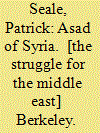

|
|
|
|
|
| Publication |
Berkeley, University of California Press, 1988.
|
| Description |
552p.Hbk
|
| Standard Number |
0520066677
|
|
|
|
|
|
|
|
|
|
|
|
Copies: C:1/I:0,R:0,Q:0
Circulation
| Accession# | Call# | Current Location | Status | Policy | Location |
| 030876 | 923.15691/SEA 030876 | Main | On Shelf | General | |
|
|
|
|
| 3 |
ID:
110292
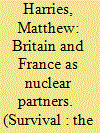

|
|
|
|
|
| Publication |
2012.
|
| Summary/Abstract |
In November 2010, as part of a broad-ranging bilateral defence agreement, the United Kingdom and France signed a treaty providing for limited cooperation on nuclear weapons. Modest in scope, and the product in immediate terms of economic pressure, the nuclear treaty's main substantive provision is for the joint construction of radiographic-hydrodynamic facilities. Beneath the surface of this treaty, however, lies a story of significant strategic shifts, and there are intriguing possibilities for future collaboration between the UK and France, and perhaps for trilateral cooperation involving the United States.
The potential for UK-French collaboration spans the spectrum of nuclear-weapons issues, from technology to policy, and perhaps to operational matters. These possibilities are sensitive, not only because they run into the everyday difficulties of political-military relations between the countries, but also for their relevance to two current debates: the ongoing battle over renewing the UK's fleet of strategic nuclear submarines, and international demands for multilateral nuclear disarmament.
|
|
|
|
|
|
|
|
|
|
|
|
|
|
|
|
| 4 |
ID:
121186
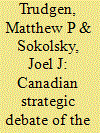

|
|
|
| 5 |
ID:
119138
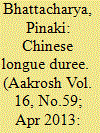

|
|
|
| 6 |
ID:
145537
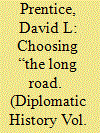

|
|
|
|
|
| Summary/Abstract |
Focused on Richard Nixon, Henry Kissinger, and the Paris negotiations, scholars have overlooked Melvin Laird’s role as secretary of defense though his Vietnamization ended America’s presence in the ground war. I argue that Laird was Vietnamization’s architect and that in 1969 he proved critical in the formation of Nixon’s Vietnam strategy. That year, Nixon and Kissinger devised an elaborate plan to threaten and then launch a bombing campaign against North Vietnam to compel its capitulation. Laird contended the domestic front would not tolerate such a mad scheme. Instead, he developed what became America’s exit strategy, Vietnamization—the strategy of improving South Vietnamese military capabilities while withdrawing U.S. troops. Through Laird’s efforts, Vietnamization replaced Kissinger’s strategy to halt troop withdrawals and use unrelenting military force against North Vietnam. By the end of 1969, Nixon sided with Laird, hoping that Vietnamization could win the war at home and abroad.
|
|
|
|
|
|
|
|
|
|
|
|
|
|
|
|
| 7 |
ID:
173281


|
|
|
|
|
| Summary/Abstract |
ANATOLY DOBRYNIN'S unprecedentedly long (24 years) mission as head of the Soviet Embassy to the United States and the fast scientific and technological developments in the sphere of space research can become the subjects of many articles. This article is limited by the period between the early 1960s when he was appointed Ambassador to the United States and the first Soviet-American "handshake in space" in 1975 that opened the road toward practical international cooperation in outer space. Here I will only partially touch on the immeasurably big contribution of scientists into tuning up the Soviet-American relations in this sphere.
|
|
|
|
|
|
|
|
|
|
|
|
|
|
|
|
| 8 |
ID:
121919
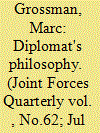

|
|
|
| 9 |
ID:
093625
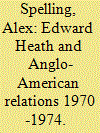

|
|
|
|
|
| Publication |
2009.
|
| Summary/Abstract |
As British Prime Minister, Edward Heath is generally believed to have presided over a distinct cooling in Anglo- American relations. His frosty personality, use of the term "natural"-instead of "special"-relationship, and determination to re-orient British foreign policy towards the European Community are felt to have deliberately foreclosed a more intimate partnership with the administration of Richard Nixon. This interpretation is captured most vividly in the writings of the President's National Security Adviser, and later Secretary of State, Henry Kissinger. In contrast to such views, this article argues that despite considerable challenges, Anglo- American relations during Heath's premiership were not fundamentally weakened. Nor can Heath be considered "anti-American." Moreover, the frictions experienced were often the result of American actions rather than anything which happened in London. A new understanding of Heath's actions and the circumstances of the time are needed when assessing the "special relationship" in this period.
|
|
|
|
|
|
|
|
|
|
|
|
|
|
|
|
| 10 |
ID:
154816


|
|
|
|
|
| Summary/Abstract |
The years following the signature of the Nuclear Non-Proliferation Treaty (NPT) of 1968 have generally been seen as a period of neglect in US non-proliferation policy. While joining recent scholarship questioning this, the article also shows that the policies that emerged from the Nixon–Ford years were the product of a broad range of factors that constrained both the United States’ ability and willingness to build an effective non-proliferation regime. These included the Nixon administration’s initial skepticism regarding the NPT, as well as the global dispersion of power away from the US, combined with the continued importance of anti-Soviet containment.
|
|
|
|
|
|
|
|
|
|
|
|
|
|
|
|
| 11 |
ID:
132285
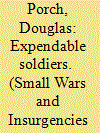

|
|
|
|
|
| Publication |
2014.
|
| Summary/Abstract |
Foreign Legions in the generic sense have evolved in ways that would surprise Beau Geste. Not only are more foreigners or recent immigrants enlisting in Western military forces, but also the post-Cold War era has seen the revival of warlord militias and Private Military Companies. Western militaries, in particular that of the United States, have also sought to increase their strategic reach through security assistance to regional military forces. While there have been some successes, security assistance has proven to have its limitations, not to mention unintended consequences for civil military relations, democracy promotion, and military efficiency.
|
|
|
|
|
|
|
|
|
|
|
|
|
|
|
|
| 12 |
ID:
100590
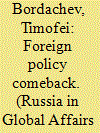

|
|
|
| 13 |
ID:
122592
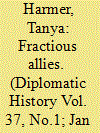

|
|
|
|
|
| Publication |
2013.
|
| Summary/Abstract |
The Nixon and Ford administrations celebrated the 1973 Chilean coup and did everything they could to help the dictatorship that followed. Secretary of State Henry Kissinger, in particular, supported General Augusto Pinochet's regime and turned a blind eye to its human rights abuses. But how did the Chilean dictatorship view the United States and how did the relationship play out in practice? Drawing on Chilean and U.S. documents, this article argues that in spite of Kissinger's efforts, bilateral relations were actually rather tense. Not only did the Chilean dictatorship continually request more than the Ford administration could offer but Santiago's military leaders also had different conceptions of the Cold War and how to fight it. This, in turn, sheds light on the problems U.S. policy makers faced when dealing with anti-communist Third World allies. It also points to the fragmentation of the global Cold War struggle in the mid-1970s.
|
|
|
|
|
|
|
|
|
|
|
|
|
|
|
|
| 14 |
ID:
105089


|
|
|
|
|
| Publication |
2011.
|
| Summary/Abstract |
According to the New Yorker, Barack Obama boned up on international affairs to prepare for the presidency by reading Thomas Friedman. For foreign-policy cognoscenti, this is like reading John Grisham novels to study for the bar exam. With most of the Republican 2012 wannabes, like Obama, having spent their careers focused on domestic issues (or in the case of Donald Trump, the Miss USA pageant), it seemed only fair for FP to help these international relations neophytes. So we asked an array of seasoned foreign-policy professionals and general smart folks to provide reading suggestions for our aspiring leaders. The one obvious conclusion? All roads to understanding American foreign policy run through Joe Nye.
|
|
|
|
|
|
|
|
|
|
|
|
|
|
|
|
| 15 |
ID:
171047
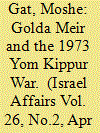

|
|
|
|
|
| Summary/Abstract |
Most historians blame Israeli Prime Minister Golda Meir for the outbreak of the 1973 Yom Kippur War, having allegedly rejected all peace proposals made by Egyptian President Anwar Sadat. In fact, Sadat was adamantly opposed to Meir’s demand for direct negotiations, envisaging political settlement as an American dictate on Israel. The Yom Kippur War shook both sides of their intransigence and brought them closer to each other’s position.
|
|
|
|
|
|
|
|
|
|
|
|
|
|
|
|
| 16 |
ID:
106561
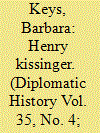

|
|
|
| 17 |
ID:
102959


|
|
|
|
|
| Publication |
2011.
|
| Summary/Abstract |
Henry Kissinger was the single most controversial diplomat of the 20th century. This article explores Kissinger's approach to the philosophy of realism in international affairs, his role in Vietnam policy making, and his most recent engagement in the debate over the Iraq War. It argues that Kissinger's realism, although philosophically consistent and having roots within his own life's experience, was always tempered by his desire to exercise influence within the American political system. Once in office under Richard Nixon and then Gerald Ford, Kissinger came to recognise how significantly domestic politics shaped American foreign policy. His involvement in the Vietnam War demonstrates this, and one lesson he took from that conflict was the hope that Americans could be persuaded to move away from their convictions about American exceptionalism and recognise the limits of American power.
|
|
|
|
|
|
|
|
|
|
|
|
|
|
|
|
| 18 |
ID:
107848
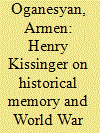

|
|
|
| 19 |
ID:
127454


|
|
|
|
|
| Publication |
2014.
|
| Summary/Abstract |
IN HIS BOOK Diplomacy, Henry Kissinger concludes that the United States "faces the challenge of reaching its goals in stages, each of which is an amalgam of American values and geopolitical necessities."1 The recent debates about U.S. military options in Libya and Syria reflect the enduring tension between these intertwined, at times competing components of our external relations. No U.S. statesman can ignore this dilemma, and none will find it easy to strike exactly the right balance between the two, especially in times of crisis.
|
|
|
|
|
|
|
|
|
|
|
|
|
|
|
|
| 20 |
ID:
038676
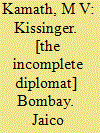

|
|
|
|
|
| Publication |
Bombay, Jaico Publishing house, 1975.
|
| Description |
367p.Hbk
|
|
|
|
|
|
|
|
|
|
|
|
Copies: C:1/I:0,R:0,Q:0
Circulation
| Accession# | Call# | Current Location | Status | Policy | Location |
| 014557 | 923.273/KAM 014557 | Main | On Shelf | General | |
|
|
|
|
|
|
|
|
|